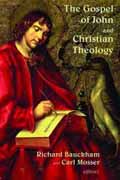
In recent years, the disciplines of biblical studies and systematic theology have grown apart and largely lost the means of effective communication with one another.
Unfortunately, this relational disconnect affects more than just these particular fields of study; it impacts the life of the church as a whole.
The first St. Andrews Conference on Scripture and Theology brought leading biblical scholars and systematic theologians together in conversation, seeking to bridge the gap between them.
Due to its profound influence on the development of Christian theology, John's Gospel is an ideal base for rekindling fruitful dialogue. The essays here - taken from the inaugural conference - consider this Gospel from many angles, addressing a number of key issues that arise from a theological discussion of this text: John's dualism in our pluralist context, historicity and testimony, the treatment of Judaism, Christology, and more.
'This is the beginning of a conversation that can only be enriched by variety and experimentation. . . . It is a signpost . . . pointing towards a not-too-distant future when interdisciplinary conversation and collaboration between these two natural partners will become, no longer occasional and surprising, but a normal and essential element in the flourishing of both.' Richard Bauckham (from the introduction).
Unfortunately, this relational disconnect affects more than just these particular fields of study; it impacts the life of the church as a whole.
The first St. Andrews Conference on Scripture and Theology brought leading biblical scholars and systematic theologians together in conversation, seeking to bridge the gap between them.
Due to its profound influence on the development of Christian theology, John's Gospel is an ideal base for rekindling fruitful dialogue. The essays here - taken from the inaugural conference - consider this Gospel from many angles, addressing a number of key issues that arise from a theological discussion of this text: John's dualism in our pluralist context, historicity and testimony, the treatment of Judaism, Christology, and more.
'This is the beginning of a conversation that can only be enriched by variety and experimentation. . . . It is a signpost . . . pointing towards a not-too-distant future when interdisciplinary conversation and collaboration between these two natural partners will become, no longer occasional and surprising, but a normal and essential element in the flourishing of both.' Richard Bauckham (from the introduction).


